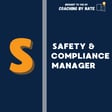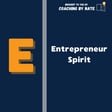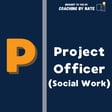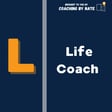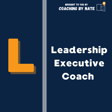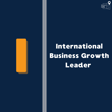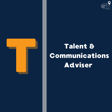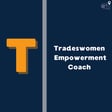Become a Creator today!Start creating today - Share your story with the world!
Start for free
00:00:00
00:00:01

Investment Broker: From a negative recruitment experience to passion, Joel turned investment brokering into entrepreneurial adventure!
In this week’s episode you will be hearing from Joel, as an investment broker, he will teach us your personal brand is everything. You will learn how to lean into your natural skill sets, how to work with a recruiter and the importance of turning down opportunities that don’t fit with your values.
Transcript
Introduction to A to Z Jobs Podcast
00:00:05
Speaker
Welcome to A to Z Jobs, the podcast that delves into the fascinating world of careers, one profession at a time. In each episode, we'll deep dive into a specific profession, exploring its history, requirements, challenges, and rewards. So get ready to expand your horizons, challenge your perceptions, and discover a world of possibilities.
Meet the Hosts and Guest: Roxy, Nate and Joel
00:00:24
Speaker
I'm Roxy. And I'm Nate. And we're excited to host you on this journey. In this week's episode, you'll be hearing from Joel. As an investment broker, your personal brand is everything.
00:00:34
Speaker
learn how to lean into your natural skill sets, how to work with a recruiter, and the importance of turning down opportunities that don't fit.
Exploring the Role of an IFA Broker
00:00:42
Speaker
Welcome, Joel. Thank you for joining us today on our podcast. Thank you for having me. No worries, always. Let's jump straight in and ask you what you do for a living. Absolutely. So I'm an IFA broker, and Hong Kong basically just means that we're into, say,
00:00:58
Speaker
Personal finance and financial consultancy for a lot of personal clients and also maybe small to medium corporations. Sometimes we consult the clients for them to start building a portfolio or to optimize their current portfolio. So some people might have something done already.
00:01:14
Speaker
but they want some direction or it's not really necessarily achieving what they want or their goals or sometimes it becomes too hefty for them.
Understanding Client-Centric Financial Solutions
00:01:22
Speaker
We're here to help them to reorganize or optimize their portfolio to get their wealth accumulation or sort of financial freedom, those type of goals. So mostly what we do is we give them a full financial analysis to sort of understand their background.
00:01:35
Speaker
And then once we do that, we give the most tailor made solutions that we can to our clients because our broker has all of the different principles being in partnership with us. So basically we have everything that's available on the market today. And once we have that, we can kind of pick and choose, cherry pick the best type of stuff to give up to our clients and give them the most, I would say the most tailor made best solution for them within their capabilities. So yeah, that's basically what I do.
00:02:04
Speaker
That's brilliant. So what kind of investments do you get your clients involved in?
00:02:09
Speaker
So it really depends actually, because some people would have a higher level of risk tolerance, or some people would have bigger goals that they want to achieve in a certain period of time. And a lot of times there's a big level of compromise towards, oh, am I going to accept something that is low risk, less management, but possibly a lower return, or something that is a little more volatile, but still within controllable ranges of risks to help them kind of get to where they want
Building Client Relationships in Finance
00:02:36
Speaker
to go.
00:02:36
Speaker
So the process of having the KYC or knowing your client process becomes significantly much more important than just being a product selling person, of just pushing things out and kind of throwing into the wall and seeing what sticks. It's more of like, all right, let's get this from step one, understand where we're going, and let's make that journey together. So you're kind of doing what we're doing. You're interviewing people. You know what they do for a living and you're helping them out.
00:03:04
Speaker
I'm not as professional as you guys are. More professional than us. So what does it look like during the day for you? Is there an average day and what does that look like?
00:03:17
Speaker
So the fun part about this job is that it's incredibly flexible. You can be the type of person that I would separate into two parts, actually. There are parts of people who, as usually as they just start off, would have to start up by cold calling leads into things, right? So calling up numbers or following up the list of clients that we currently have or people who have left and following up on those, setting up appointments and also meeting them, building a personal relationship with them first, and then
00:03:47
Speaker
maybe from then on proceed to see what you can offer them. But then also we have people who use digital platforms like Facebook or Instagram, building their own pages and giving different values to different clients. Most of them are obviously about finance, but some people who come from a medical background could build a medical page and sell probably related medical products.
00:04:11
Speaker
and also sort of just online marketing, creating ads, maybe getting this flashy title or this type of concepts that maybe are contradictory from what people traditionally would think of in the finance world or in the traditional investment world, then giving them from then on a different type of perspective and getting their interest to kind of following up on those.
00:04:32
Speaker
But then when you hit sort of like the mark where I am now, when you kind of get your client base down or you've been here a while, then you have this client base
A Day in the Life of Joel the Broker
00:04:41
Speaker
that builds up. Then you can follow up on the current clients that you have now and sort of obtain referrals from then on as well. So it's kind of flexible. There's no really set thing to do, but for me, my day-to-day consists of me waking up, listening to my financial headlines for me to catch up on the news of the day.
00:04:59
Speaker
seeing if there's anything interesting that I thought could be like sharing topic or writing some sort of short articles or excerpts from them and then probably sending to my clients, letting them know, Oh, what's happening of all this stuff.
00:05:13
Speaker
and reviewing some of my client portfolios. But then the most major part is seeing clients and communicating with them, understanding their needs, and see what we can give to them. And then at the end of the day, we have the admin phase, which is sort of like just a documentation, bookkeeping, and filling out the forms and signing things, and that's really it.
00:05:30
Speaker
Brilliant. All walks of life then, like different stages, people in different industries. Would you take on somebody like me just trying to put together a little portfolio for my son?
Career Building and Education
00:05:42
Speaker
Of course, absolutely. I mean, everyone starts somewhere, right? Everybody has
00:05:47
Speaker
a different goal in mind. Some people maybe have no relevant education or even interest in doing any of this type of stuff. But some people still want to have their retirement secure or an education fund secure. Everybody's got to start somewhere. So no matter big or small, I take whatever I can, as long as it helps them at the end of the day. That's where it really matters to me.
00:06:11
Speaker
That's brilliant. I think most people wouldn't have a clue. I don't have a clue. I'm listening to Barefoot Master at the moment, just writing down keywords to ask people. It's one of those things, you know, you know, you should be doing something with it, but you don't really know how or when or why. So I think, yeah, I mean, I'm definitely in that boat. Well, we had a podcast last week with a lady called Katrina who talked about, um, the greatest time to plant a tree was 20 years ago.
00:06:40
Speaker
And the second greatest time is now. And that just resonated with me about these baby shares. I need to get the shares in for my son like yesterday. The saying in finance is also saying, when is the best time to invest? It's yesterday. And the second best time is today. So that's very similar concept. But yeah, you mentioned that.
00:07:01
Speaker
At the start of the career, you've got that cold calling phase and then you eventually build that client base. How long would that take you? How long would you expect if you're a good cold caller, you're a good networker? How long would that take?
00:07:16
Speaker
I would say if you're really in the Hong Kong market specifically, to really build up a good base takes at least three to five years if you're just doing it the traditional way. I would say I got a bit lucky myself because I am fluent in three languages, so a lot of times surprising opportunities pop up.
00:07:36
Speaker
And having that, also working hard, learning finance at the same time as working this job and kind of just not giving up in between, I think I've accelerated my rate to become a little less than two years to sort of have that 60 to 100 people in the database to kind of just call up in reviews and cycle through and maintain the relationship with.
00:08:00
Speaker
But yeah, and normally I would say on average from experience, I would say at least three, maybe up to five years to really get to the point, the critical matters. It's not a quick win. You've got to be passionate about what you're doing. If you're going to Cold Cold Line, yeah. What is the other route then? If you're saying if you do the Cold Cold, do you just join an agency and sort of build it from there or?
Joel's Career Journey and Mentorship
00:08:28
Speaker
So there are ways of doing things, right? So I mentioned earlier, we have the cold call ones, we have the online marketing, which also technically counts as cold calls. But there are ways where people would use their existing networks, say their family, their friends, their ex-colleagues.
00:08:45
Speaker
So there are a lot of ways of finding people and approaching and we call those warm calls and warm calls are typically easier because you already have a relationship built up with this person. So you don't have to do all of this trust building or warming phase or you don't necessarily need to have such good communication skills sometimes because the people already know you for who you are, they have this level of trust in you. Whereas if you're doing the cold calls, you have to give them a certain level of value before they really start listening to what you have to say.
00:09:15
Speaker
So that part, sometimes warm calls is the easiest way to start up, but I was a little bit different. I said I didn't really want to cash in my current network until I sort of know that I want to commit into this or knowing that I can bring some actual value rather than just being a person who just sells a product and makes a commission off of that. Yeah, exactly. You don't want to drag in your grandma if you're not 100% sure yet that you're still working it all out.
00:09:43
Speaker
grandma, this is a great 60 year pension fund. I've been recently listening to a podcast called She's On The Money, which is a lady in Melbourne talking a lot about finance and she's no longer a financial advisor for this reason. She's now an influencer. She's a thin, thin, thin influencer. I can't say the word. It doesn't roll off the tongue exactly.
00:10:11
Speaker
No, don't know, she says it like it's nothing but um but I can see that you know she's turning someone like me into sort of a warm caller because through those um interactions but I can imagine like with you guys you have to sort of leave a certain level back for your online marketing like I think I don't know about Hong Kong if they're similar rules to Australia now but um
Mindset and Motivation in Finance Roles
00:10:37
Speaker
Yeah, I can imagine building that database would be hard for three to five years. It does take a little bit of effort, but once you kind of get there, I would say it becomes progressively easier. So you just kind of need to stick it through for the initial type of part of time. And then afterwards, it kind of just, you will see the end. You would see the end point somewhere, and then you can go even further. Yeah, exactly.
00:11:06
Speaker
Oh, that's amazing. It's amazing how people orientated it is. I just kind of didn't, you know, you're moving from person to person, you're getting referrals, you've got to be that kind of. Are you feeling inspired by everything you've learned so far? Keep that momentum going with our four-part Career Change Made Easy course. Dive deeper at thecareerchangecoaches.com. Now enjoy the rest of the podcast.
00:11:35
Speaker
communication, you've got to get the soft skills. And you're also mentioning your, you know, your core skills already. You're saying you speak three languages and that helps. Do you only work with Hong Kong or is it global clients as well? I would say my client base is around 80% local Hong Kong's and about 20% traveling professionals. So I have clients that are from mainland say, for example, a product manager Alibaba is one of my clients, right?
00:12:03
Speaker
And then we have some people from the HKJC, which is the biggest nonprofit company in Hong Kong. I also have certain other big clients that I don't think I'm allowed to say technically, but yeah. So some of them are more of English-based clients that are traveling professionals, but still want to have something rather than just putting it in the bank and kind of knowing nowhere else to put to.
00:12:29
Speaker
Yeah, definitely. I love Ali Papa. I was going to invest in a whole bunch of pizza shelves shelving unit, but yeah, I could be it. I could talk to you about the rages, buy thousands of them and sell them in Australia because you can't find them at Bunnings. So how did you get started in all of this?
00:12:50
Speaker
All right, the journey. So I started in 2020. My last job, I left a very high position in a very exquisite brand in Hong Kong, very high service level. I'm talking the number one place of Hong Kong. Then I realized during the job that I had to deal with a lot of big personalities that weren't necessarily justified.
00:13:14
Speaker
And I feel like it was a very toxic work environment. I don't feel like my work was appreciated. And I felt like I had to take on a lot more responsibility than I was due. So at the end of 20, at the midway point of 2022, when our company was kind of like sort of downsizing a bit, I elected to leave and saying, you know what, I don't think this is the place for me to go.
00:13:39
Speaker
And knowing that I've reached from such a top pinnacle of my field, of the service industry, I was thinking, okay, where else can I go to? I felt an urge to kind of change lanes, if you will. And I ended up actually working with a head hunter from Page Personnel, a lovely person. And she encouraged me to join this role that is a sort of high end customer service in a big medical group in Hong Kong.
00:14:10
Speaker
And little did I know that I was swindled into a role of telesales. Ah, plot twist. And ended up hating the job. I absolutely hated it. I dreaded every single day. I was there for five days and the training took three days. And so we were only doing sales on Thursday and Friday. But on Thursday, the first day that we're doing calls, I was already making sales on the phone. I was one of 12 people, I was one of the only 12 people
00:14:39
Speaker
who made sales at that point, sorry, one of 12. The other rest didn't make anything, but I already was selling deals. And that's when I realized, oh, actually,
00:14:48
Speaker
had this ability, you know, even just by phone, not even using my body language or my charisma, if you will. And so I debriefed with my headhunter afterwards and she said to me, why don't you try a role that involves in-person selling, but in a way that's a little more professional level rather than just a salesperson
00:15:13
Speaker
to try a professional sales service and purely by chance just applying to this role and meeting my fantastic boss who was really accepting of who I am as a person, also knowing I have no finance background, was willing to dedicate his time and his profession basically to teach me all the things I needed to know in starting up in this field.
00:15:38
Speaker
And I also consider myself to be pretty self-sufficient in a lot of ways. I kind of just find my own answers. And if I can't, then they start asking questions. So a lot of times I don't want to get in my boss's hair. I want to make sure that what I ask him is of value and it's worth his time. And so then on, he just sort of nurtured me into becoming this professional person with a very strong moral standpoint.
00:16:03
Speaker
of, okay, if you want to go the cold call route, that's fine, but it's going to be 10 times as hard than doing the warm calls route. Are you willing to do that? And I said, yes. He laid all the facts on the table, gave me all, showed me all of the cards. And what I really remembered specifically was really appreciating his honesty towards getting into this job, because I felt like I was sort of swindled by my last job and ended up being in this role now for three years.
00:16:31
Speaker
That's awesome. It's amazing when you find one person and then they sort of implant their knowledge on you and that's great. And you're enjoying it? I love what I do. I think it's very fun. I'm constantly challenged by having to learn new things. The market changes every day. So you have to be sort of on your toes all the time, kind of up, in taking and outputting information at the same time at a very high speed.
00:16:59
Speaker
and learning how to communicate with other people as well in different levels. Say some people would have a professional background but some people would not and how would you
00:17:09
Speaker
Even bringing in the same concept, how would you deliver the message? Would things change differently? Would you use some sort of terms that are a little more layman or easier to understand for the regular Joe? And at those points, it makes it a lot more challenging because the job itself inherently is a tough job, but you got to find the fun in that. And I find that challenging and it makes me grow as a person.
Overcoming Challenges and Personal Growth
00:17:33
Speaker
And so I love it every single day.
00:17:34
Speaker
That's awesome. You're taking something incredibly complicated without a financial background and turning it into a dummies for people. You have to have pretty good, you know, communication skills for that. I think it's also worth reflecting. So you mentioned working with a recruiter or a headhunter and you're the first guest we've had that's actually brought this up. And it's one of those areas that
00:18:01
Speaker
You know, some recruiters, they get a bit of a hard rap, you know, they, you know, trying to make the quip buck, they just want their commission and those recruiters exist. But you do get some good headhunters and there are some good networks out there.
00:18:15
Speaker
And it's worth having those discussions. Even if you don't sign up with them, don't put your name forward to a role. The wealth of knowledge they have is amazing. It sounds like they gave you quite a good amount of education on some different options. And that's worth having a chat to someone about. And even, I love that you put yourself out there one week. That's awesome. So one week in a job and like, nah, that's not for me. I love it.
00:18:41
Speaker
Well, I was swindled into the role. I don't think I had, I don't think I was very clear about what I was doing. And the contract also had a different name on it, but yeah. Oh, wow. Okay. That's a different level of swindle then. But you also want the confidence to turn around to your headhunter and say, you are helping me provide this service. This isn't what I'm looking for. And actually getting the
00:19:07
Speaker
the right service out of that person you know and pushing a lot of people wouldn't push especially when you're approaching a headhunter because you don't know exactly what you're looking for you're asking them for
00:19:19
Speaker
this you know and it could be this I'm doing this with video it could be large or small um so it's just if you know to have the guts to turn around and go no this isn't what I'm looking for and I need you know this is what I liked about the role even though it was five days of um something you didn't enjoy you still were able to come out of and go these were the pros and cons to help you look for a job further on and I think that's brilliant and I think that's what a lot of people need to learn how to do
00:19:49
Speaker
Absolutely. I don't think it was really more on my part than it is that I met the right person at the right time.
00:19:56
Speaker
I feel like they really gave me, especially after I told them that I wasn't happy in the role and they decided to resign. I actually don't think I consulted them about the part I was resigning, but she offered to see me in person and said, let's have a debrief. Let's, let's talk about it. Let's see what I can do for you to help you help me at the same time. And I thought that was a very good gesture from her and gave, made me trust her a lot more and
00:20:22
Speaker
are more willing to try different things and try different roles to see, oh, what would really help me out being in a completely foreign field? But I realized that you need that challenge to grow. You need to have that thing that is a bit different for you to get yourself out of that comfort zone to realize, oh,
00:20:44
Speaker
I've never learned about this, but turns out this is something that's really for me. Like I was sort of made for this, but if I didn't try it, I would have never found out. So I would say it's a lot more on her than it is on me. And I think the credit is due to having a wonderful person who is open and willing to have a conversation about it, rather than just saying, I'm also just working for a commission. I think that's what really set her apart for me at that point. It's brilliant. It's good to have a good person like that.
00:21:13
Speaker
If you were to give yourself advice, if you were to start again, how would you get to where you are now faster? Is there a different path you could have taken?
00:21:21
Speaker
I don't necessarily think that I would get here any faster Because if I did it's like it's also like investing if you drive your car too fast you're gonna risk a car crash and Same in the finance role if you invest you want this type of big returns. You're gonna have a higher chance of crash
00:21:43
Speaker
your portfolio as well. And I think for me, it's the same progress for my work development, my professional development. Whereas if I didn't do all the hard work, if I didn't build the basis of knowledge, if I didn't take the time to learn the fundamentals, to understand what's going on, to build this sort of matrix in my head to understand, all right, what's the chain effect? What's the base rules? If I didn't take the time to do all of that,
00:22:09
Speaker
I don't think that it would have gotten me to the point where I am now any faster or any way better because I feel like it wouldn't have been sustainable. Obviously, I could have cashed in a lot of different friends and saying, oh yeah, no, buy this, trust me, this is great, blah, blah, blah. But I don't think that for me, my heart of hearts felt like that would have been the right thing to do.
00:22:32
Speaker
So there are obviously faster ways to get to the position that I am now or the results that I have today, but it maybe would not have been the most sustainable way of doing it. So no, I don't think there necessarily is an easier path or a faster path to get to where I am now. It's funny. We've asked a few people that and the reaction is actually, what I've learned got me here. And it, you know, it's so true.
00:23:03
Speaker
So what would be your favorite thing about your job at the moment? My favorite thing about my job, I would say there are a lot. The flexibility of time, right? Like I think that being flexible on my job, like I can kind of dictate how my day goes. If I feel like I need a bit more rest, I can set my clients in the afternoon. I think that's one of the best things. But I would also say like my favorite thing is whenever some portfolio comes over,
00:23:33
Speaker
And I kind of get to be this person that's almost like a doctor, kind of assessing what was the problem and kind of fixing things. And the fact that I get to have new stuff learned every day keeps myself challenged and on my toes. That also is very fulfilling. So, yeah, closing deals, actually, I would say.
00:23:54
Speaker
I take that back. Closing deals is my favorite thing about my job, because the dopamine rush I get can last for days, sometimes weeks, and that's the best part. Because starting from a cold, cold business, from a complete stranger to you and to them, the fact that they trust you enough to want to build this wealth journey with you,
00:24:16
Speaker
It's a big commitment. And I feel like the fact that I could convince them using my professionalism, using statistics and using personality skills, the soft skills, a combination of all of that successfully closing a deal and helping them at the same time. I think that level of dopamine rush isn't something that I don't think I can get from anywhere else ever. So I think that for me, it would be my favorite thing.
00:24:45
Speaker
That's brilliant. It's funny how you start with one and then list five and then work on exactly what it is. It was a journey, but I got there. You know, it's great. It's a good cycle of what you go through in a day and then, you know, starting from the beginning to the very end of, you know, being able to have the flexibility then to learning and always learning in your job is such a crucial thing in your career.
00:25:08
Speaker
um it's something that keeps everyone going and moving forward and then the other side of it is you know the actual product what you do you know what you produce and how you help people which is amazing absolutely so what about the negatives what do you dislike about the rock oh okay uh there's for me this job only has one negative mostly because i'm a pretty self
00:25:36
Speaker
a sustainable person, right? So I'm pretty self-motivated in a lot of ways. I don't really need people to tell me what to do to start getting things done. So I don't really need that kick in the butt when everybody else maybe would need it more often than I do. I think the hardest part and the part that I think is the worst about my job is being 100% commission-based. Because if you don't close deals, you don't get paid. That's just how it is.
00:26:01
Speaker
And I think that that creates a field where it seems very daunting to even get into in the first place because you would essentially from a stable job having this fixed income to a point where you have to build your own business, create your own network, do all of this work for maybe not a lot of payoff in a maybe sustainable period of time. So I feel like that was very hard for me initially.
00:26:28
Speaker
And so I would say that was the worst thing about this job, having this fully 100% commission based kind of system in there. That makes sense why you get such a high drive when you do lock in that deal.
00:26:45
Speaker
Yeah, I'm a creature of comfort. So for me, I would always prefer security and comfort, but being in this job, it just really changed me completely. It made me a more adventurous person. It made me want to try new things, try new experiences. But then also, at the core of my being, I'm still a creature of comfort. So sometimes not closing deals or having this period of downturns, it puts a lot of anxiety within me.
00:27:12
Speaker
But yeah, I would say that that's just what's scary. But that's also why it's challenging at the same time. Yeah, it's what pushes it forward, right? How? I'm just interested because I suppose Roxy and I are on a similar journey at the moment, starting a small business and trying to get out there on our own. So I must admit, that's one of the challenges I have. Even just going from a full time
00:27:35
Speaker
permanent role, shifting to a contract role and now looking at running your own business, like it's scary. How did you get to the mindset where you're like, no, this is definitely the way I need to do
Navigating Rejection and Building Resilience
00:27:47
Speaker
it. Was there a decision process or you just fell into it and just were confident with it?
00:27:54
Speaker
I feel like for me, I'm naturally a pretty confident person. And I sometimes put that up as a front, even when I'm not necessarily the most confident about what I do. I rush into things. If I were to commit to it, I would rush into it head first and just say, let's see where this goes. I mean, what's the worst thing, right?
00:28:13
Speaker
I think that for me there wasn't necessarily a big turning point rather than it is more of a period of just doing it consistently and it sort of becomes a part of you. Then you really stop thinking about the failures more on focusing on how do I get the win rather than focusing on the L's or the lack of clients or the lack of attention or the lack of
00:28:42
Speaker
anything really. I think it was just being consistent and being 100% committed into what you're doing. And eventually you would kind of have that switch slowly turn on. It's not a specific one moment for me, but it was more of a journey, a way of getting there. It was a slow shift rather than a moment.
00:29:03
Speaker
It's kind of like a slow shift of working out your personal brand and how you communicate with people how you run the job how you get involved and then how you start that business and how you get more and more and you get more into the group of being able to talk to people and that false confidence then becomes a stronger more rooted confidence where you become a self-branded human being which is really exciting.
00:29:31
Speaker
I also think that one thing that's very specific is that you would always have to be your biggest cheerleader. So even when necessarily not a lot of people believe in you, you need to back yourself up first. Because if you don't, even if other people are pushing you up,
00:29:47
Speaker
You're not gonna go anywhere. You have to believe in yourself and make sure that, all right, I can do this. I might not do it the best. I might not do it 100% amazing right away, but eventually I'm gonna get there. And it's the persistence, the drive to getting to that, rather than being a perfectionist, but the strive of trying to become one. That really helps you motivate yourself and keep yourself going.
00:30:14
Speaker
And also to appreciate yourself and give yourself a pat on the back once a while. Yeah. My husband's favorite quote is there are a million reasons not to do something, but what is the one reason that you're doing this and focus on that? Keep going. And I think like you can focus on so many different negatives of it, but if you can keep that confidence going and keep it moving, then you're going to be able to do it somehow. Yeah.
00:30:43
Speaker
So if you had any advice for anybody starting out in your industry, what would that be? I would say because of our field, you're going to get a lot more no's than you are going to get a lot more yes's. So don't take rejection too personally. Rejection is in our field at least. It's just as common as brushing your teeth or having lunch. Like it happens every single day.
00:31:06
Speaker
But if you were to magnify it and just focus on, oh, yeah, somebody rejected me. Is it because I'm this or that or that? It's just going to pull yourself down and it will make you want to quit, especially being the cold cold field, starting in the cold cold field. You're going to have a lot more rejection than you would a lot more successes.
00:31:26
Speaker
And you can bring up that rate by improving your skills. And I think self-reflection is important as well, but don't take the no's too personally. Sometimes it's not a no to you as a person. It's just a not now or a not this. And you need to be able to identify what it is. And if you take it too personally, you're going to have a really bad time. It's almost like asking why somebody says no and almost saying, I'll come back to you with an answer.
00:31:55
Speaker
rather than going, no, it's the personal meat. It's awesome. I do have a quick question. Where do you find your cold calls? How does that process start and begin, start and end?
00:32:10
Speaker
So in Hong Kong, we have a couple of different ways. We have consultants calling old lists. We have the older list of kind of just setting up those appointments. We have clients who are maybe left from their previous consultants. And so when they left, they would have, we would call them orphaned, basically.
00:32:31
Speaker
And they would call these orphan clients and kind of saying, all right, we're going to represent you now. Is there anything we can help? Let's update your portfolio. Let's see what's going on. Is there anything we can help provide extra? And there are also ways where you can buy leads and you can also do online marketing as well. So there are a couple of different ways. There's no set way, but there's also no way that you don't have a starting point. It just depends on if you want to do the hard work or not.
00:33:00
Speaker
So you just got to pick up the phone sometimes. I just have this image from every feature film where you get the yellow pages out from start of day. Yes, if we're talking about about 10 years ago, that was the norm. But nowadays we have a little more efficient ways to do things. Yeah. But it still exists.
00:33:22
Speaker
I once had a recruitment job for two weeks, similar experience. I was sort of sold this beautiful role and I thought, oh yeah, this sounds like fun and get in there. And literally it was cold calling and it was a step up from the LA pages. It was just a database of every medical imaging facility and hospital in Australia. And it's like, all right, start at the top.
00:33:44
Speaker
you way through call at least 200 people this week or you don't have a job intense but yeah i lasted two weeks well after day one i started applying for another job it took me two weeks to get another job and get out so that's that's twice as long as i didn't i know i i thought two weeks was impressive but you're showing me up but you know i'm in recruitment now and
00:34:11
Speaker
I don't know if I could do it if I hadn't already built the database of people with my previous job.
Career Changes and Supportive Work Environments
00:34:16
Speaker
I pretty much know most of the candidates I'm talking to, so it's easy, but yeah, I don't know. It would be pretty hard going, okay, I'm hiring for this position, but I have no idea what you do, mate. So you mentioned already that you did a lot of on-the-job learning. Did you do any formal training? Is there any formal training you wanted to or that you would recommend?
00:34:41
Speaker
I have not had any training before. On-the-job training is more of a personal sort of like, imagine a crash course in finance, I would say. Basically that. But then it's a lot more of self-read, self-learning. If you don't understand then ask a question.
00:34:59
Speaker
And by slowly just building up that information, you would kind of have this base of knowledge built up. And obviously, the source has to be correct. And once you have that, you sort of just build anything on top of it. I wouldn't say particularly there's anything specifically I would recommend other than the CFP, Certified Financial Planning Certificate, that would be very this job specific, that would make you a very good
00:35:28
Speaker
in the realm of planning at least. And you can do some statistical analysis, you can kind of do models. That's a great help, but again, it's not necessary. It's not a must to have that. It's a great help, and it's also always elected. If you like the job, you can kind of go further down that path. But there's no specific course I would say that really would, oh, help you bump up your salary. Because again, we're 100% commission-based.
00:35:54
Speaker
so it doesn't really matter so you don't have to have a certain um license or anything to do what you're doing oh yes you you have to obtain licenses and you have to pass your exams and papers to get the licenses but i guess for me it wasn't that hard i had seven papers when i was in my first month of job just i had to pass all of those
00:36:18
Speaker
And for me, I didn't find that challenging. I guess I just knew how to study a bit more effectively that was taught to me in high school. So I just took the same formula and I put it how it was. And it wasn't that difficult particularly. But I know some colleagues who have failed the same tests about nine times. So you got to put in some work. You got to try. If you don't mind me asking, when you decided to make these career changes, how old were you?
00:36:49
Speaker
Ooh, three years ago, so I would say I was around 23, 24 maybe, yeah. Yeah, it's an age. 23, 24, 25 changes. I'm a firm believer with this almost like rite of passages. There's the 23, 24, and 25, and then the 30 is like the mark. And you really gotta stick to the lane that you're at.
00:37:14
Speaker
Well, no, actually a lot of the podcasts are 30 years when actually they think, crap, you know what? I haven't done what I need to do and I'm going to do it now really quickly. Like superwoman, superman quickly.
00:37:30
Speaker
I was looking double back, so I'm just reflecting on some of your answers. And so you talk about commission-based and how you need to be self-motivated. And you're going to have those weeks or days where it's just not working. It just doesn't work. It happens to everyone.
00:37:48
Speaker
How do you pick yourself back up after those moments? Is there like some sort of employee engagement system at work that you can rely on or is it something you have to organize yourself? Is there something to perk you up?
00:38:03
Speaker
I feel like in our company at least, we have this great sort of feeling where you have your immediate closest, I would say, colleagues that you can kind of run to and say, I'm having a really bad day. I've been having a really bad week. Guys, I just want to kind of like give up or I just want to like get my head out of that space. And a lot of times because
00:38:32
Speaker
your colleagues would always relate to what you say. It's easier to have them listen to what you say and kind of just let the bad blood out or let the steam out and kind of recover from that, right? But I also happen to have some really amazing friends that are
00:38:48
Speaker
in my immediate friendship circle, who always would take the time to listen to me and kind of give me a pound in the back and say, you just got to keep going. Come on. It's not forever. Trust me. The next one is going to be like having friends and colleagues that are supportive, not only in work-wise, but emotionally as well. That really made me stick to where I am.
00:39:12
Speaker
what I am doing now. I would go so far to even say if it wasn't because of my friends and these few colleagues that I have closest to me, I don't think I would have stayed at this job or been able to stay at this job at least because I would have mentally checked out too quickly. Now you have to have your vent buddies. Nathan was my vent buddy. I have to go into the HR room and be like, guys.
00:39:43
Speaker
No, it's great to also have, and also I guess it's, you know, setting up with the structure as well. Like when you change careers, you set up with your headhunter. Um, and you know, when you get to that sort of level in your career where you do feel stuck or you need that kind of self esteem of things, that's where career coaches are for. That's where recruitment support is for. And then also those friends that you can lean on that give you the right kind of push forward.
00:40:07
Speaker
to make you feel like you are doing the right thing when you've hit so many no's. And that final no just is the one thing that topples everything over. That's good. You've got such a good group, especially with colleagues, having a colleague that truly understands what you're going through and being able to talk through it. And in previous careers, I've struggled a bit with that, but I've actually reached out more.
00:40:35
Speaker
One thing I will recommend to anybody listening is that you may have a colleague that's struggling the same way. And if you are actually more honest about how your day is going rather than everything being shiny pineapples, you might figure out what you uncover and then you'll have someone to talk to. Absolutely right on that. I feel like one of the reasons why I have the group that I have now is also because we're all borderline brutally honest with each other.
00:41:01
Speaker
So if we find something that we don't like about each other in that setting, and everybody in that group sort of knows that it's not about you as a person, it's just about how we think that you're approaching this in a way that could be better. Which we also sort of, I guess because of also how we are as people, we sort of know how to pick and choose the right words.
00:41:23
Speaker
rather than making them feel like it's personal, it's a lot of times just trying to make the thing better, to help you get to where you need to go faster, or help you settle this emotion down faster, to help you recover faster. I feel like the fact that they are honest about some of my body of work
00:41:43
Speaker
or me to theirs most of the time. But having that makes it a lot more easier to have a genuine friendship and this work relationship where you can have what we call the feedback culture, where you can openly have feedback with your colleagues because you have that level of trust and you have the habit of doing so. So you're pushing each other up rather than dragging anybody else down.
00:42:09
Speaker
And it's also competitive for us is not a very competitive environment because your client is probably never going to be my client. And so for us, we don't have that sort of conflict of interest built in and it makes things a lot more easier to just kind of like hang out and just say, Hey, how are you doing? Let's get lunch together. Let's talk about this client. Let's, let's see if you need a case study.
00:42:33
Speaker
Oh, I need some help on this. What do you think about this idea? What do you think about this way of going? Do you think any way I can refine this or make it better? Or is there any words that I can choose that would make this sound a lot more smoother? So I think that having that level of trust and being open to have that open conversation.
00:42:52
Speaker
is very important but it's not a lot of people's i realize now not a lot of people's taste a lot of people would rather live in this bubble in this circle of thinking they're doing great or fantastic and sometimes you need that to be fair sometimes you need to gas yourself up absolutely
00:43:10
Speaker
But a lot more, and more often than not, it creates this sort of, and I'm going to use this word very heavily, but it creates this level of delusion almost where it's like they're infallible or they can't make mistakes or there's a level of hierarchy because I've been here longer. I feel like we have that level of trust to talk to each other and saying, all right.
00:43:29
Speaker
I think you did this well. I just think it could be done better. Or I don't think this was the right way to approach this. How about this
Industry Challenges: Post-COVID Investments
00:43:36
Speaker
way? Do you think this would help? And it gives this level of respect at the same time, giving them this level of, I would say, optimization in their work. So for us, it's a lot about efficiency. And for me, that is what I'm really grateful for. Because I don't think I could really find it anywhere else other than where I am now. And it's going to make the next job, if I leave, very difficult.
00:43:57
Speaker
it is so high but it is so true you learn of your colleagues and this is one of the hardest things like i love remote working and being able to work from home especially as a new mom but on the other side for like
00:44:12
Speaker
You know, my junior crew, my mid-level crew, they're losing out because they're not learning from the people. They're not going into the kitchen and venting out loud because they found something to some stranger and that person actually being the solution to their problem. You know, they're not stepping out of that bubble and they're not learning as much as they really could.
00:44:32
Speaker
by just that personal interaction. Just out of interest, what's the gender split and what is the turnover rate? So is it sort of 50-50 men and women working in the industry and do you find that there's a high turnover in the office or is there like a quite a solid recruitment process to ensure you're getting the right people in?
00:44:54
Speaker
I would say the male-female split is sort of, I think it would be quite even actually, especially nowadays where the recruitment sort of environment is to get the newer kids who just graduated in. I think because of that, it makes male and female kind of balanced in my office at least.
00:45:17
Speaker
Yeah, I think that for now it's pretty split. But traditionally working in this field, or even agencies, there's a lot more of females than it is males. And there is sort of this preferential bias towards, oh, I want somebody who is like this soft-spoken, lovely little girl, rather than having a guy like me, I'm 5'9", 5'10 almost. So I've got a big frame, sometimes I could come off as
00:45:44
Speaker
a certain level of intimidating. And so I have to compensate even harder in my level of speech to show that, oh, I'm actually a nice person. But nowadays, I think it's a lot more easier than it was 10 years before. So the male-female split is pretty even. But if you talk about turnover rates, in general, in this field, it is quite high. So a lot of people come and a lot of people leave.
00:46:11
Speaker
My team specifically, we don't really have a lot of people in that often, but we also don't have people leaving that often. I guess my team also has this, I'm very lucky, and we have this culture of where if you're happy and you're being able to do what you do, the production doesn't really matter as long as you hit the bottom baseline, which is very easy to meet.
00:46:33
Speaker
And so we don't really have people leaving because they're unhappy rather than people who want something more. And we're all quite supportive of that, saying that if you find this better opportunity, we would all wish you the best and send you off happily. But on the same token, we have
00:46:50
Speaker
We've heard stories of very unhappy splits, these big fights and arguments, and blackballing. And I think that it's not necessary in this environment. The job's already hard enough. Why are we fighting each other? There's no point. But some people, again, take things a little too personally, and that creates that issue. Yeah. So I would say even with the high tone of our rates, there are situations where there are exceptions, I should say. There are exceptions with that.
00:47:21
Speaker
And when the way the world's been since COVID and everything, is it actually quite hard to get people to invest or are people starting to look more into investing in the future? I would say actually because of the downturn and not people not knowing necessarily how investing on market really works, a lot of times they see downturns and they get afraid, but it's also part of our job to educate them and say, actually, no, this is a good sign. You're buying things at a discount.
00:47:49
Speaker
But it is harder at a downturn in the market, especially after COVID, to have people invest again. But the people who are open to have that conversation would more often than not find that even better opportunity than it was before COVID.
00:48:07
Speaker
or even after. So nowadays the business is hard, right? We have people who are a little more defensive naturally and perhaps of some history of getting headlines of unethical selling tactics or just maybe not the best practices. It makes our field much more harder in general, maybe because of a certain few people's mistakes.
Closing Thoughts and Humor
00:48:29
Speaker
But I also think that in the same time,
00:48:32
Speaker
We can show to the client that not everybody is a bad person. There's going to be bad people everywhere. You just have to choose the right person that you're working with. And more often than not, those are the people who are honest and upfront about the things, making sure you understand everything before proceeding and sort of letting you know that it's more of a relationship that it is just one thing.
00:49:01
Speaker
It's such a hard thing to know what you're doing right, but if you get the right person, it makes all the difference. So I move on to our last question. What is the quote that inspires you in your life?
00:49:15
Speaker
I have this quote that it's not really a quote, but it's sort of this running joke between me and my big boss and we call it gratefulness cancer, right? So basically it's terminal gratefulness cancer where it just can't be helped anymore. You're just terminally grateful about everything.
00:49:34
Speaker
And I feel like that really puts a lot of things into perspective, where you would be grateful to have opportunities to meet people. You're grateful to have your position and your job. You're grateful to have what you have right now. And that is something that I set as a reminder on my phone every single day to stay grateful. And I kind of like check it off the list of the things I need to do at the same time. So I have this daily reminder of that. And that really, really keeps me going. That's brilliant.
00:50:02
Speaker
Thank you so much for everything tonight. Is there anything that you think that we haven't covered to do with your role and your career that might be important to anybody listening?
00:50:12
Speaker
No, I think that's pretty much it. So thank you for having me. Thank you for giving me a platform to speak on what I do. I think a lot of people have misconceptions about what we do, thinking that we're just people who are selling stuff and kind of swindling out of your money. More often than not, there are people like that, but most of us aren't like that. So thank you for giving me a chance to speak on it and letting people understand more about what we do. Definitely, you've given me a lot to think about.
00:50:44
Speaker
You've been listening to Roxy and Nate. Thanks for tuning into A to Z Jobs and always remember it's your career and it's up to you to shape it. So dream big, make bold moves, stay curious and keep exploring. Check out our website at thecareerchangecoches.com for more resources, tools and upcoming training. Thank you for joining us on this journey. Don't forget to subscribe and hit that notification bell so you never miss an episode of A to Z Jobs. Remember your dream career could be just one episode away.
00:51:20
Speaker
Are you feeling inspired by everything you've learned today and ready to take the next step with your career change journey? Dive into our four-part Career Change Made Easy course. We'll help you gain career clarity, understand your transferable skills, and put them into play with application, negotiation, and interview advice. Head to careachangecoaches.com.
